For more than 60 years now, Willeke Alberti (1945) has been a very popular singer in the Netherlands. During the 1960s she was a teen idol with several #1 hits. In 1964, she was part of the Dutch delegation that won the Knokke Song Festival in Belgium, but 30 years later, her participation at the 1994 Eurovision Song Contest was a disappointment. In the meanwhile the Dutch Diva starred as an actress on stage, on TV and in popular Dutch films.
Willeke Alberti and her father, the popular ‘Tenore Napolitano’ Willy Alberti. Dutch postcard by VITA NOVA. Photo: Phonogram. Photo: Henk de Looper. Publicity card for Anker watches, imported by P.H. Bonewit, Amsterdam.
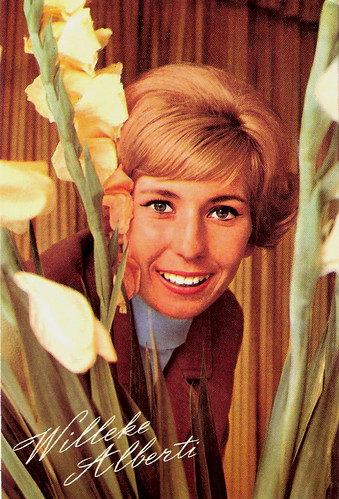
Dutch postcard by 't Sticht, Utrecht, no. 126. Photo: Philips.
Dutch postcard by SYBA and MUVA, 1965. Photo: Phonogram. Publicity card for Aktiebureau Dousadj (Dousadj is a village in Persia) which was supported voluntarily by Willeke Alberti.
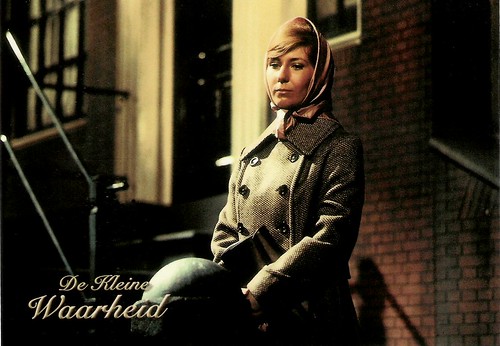
Dutch postcard by NCRV. Photo: NCRV / Instituut voor Beeld en Geluid. Publicity still for the Dutch TV series De kleine waarheid/The small truth (Willy van Hemert, 1970–1972) starring Willeke Alberti.
Teenage idol
Willeke Alberti was born as Willy Albertina Verbrugge in Amsterdam, The Netherlands, in 1945. She is the daughter of Carel Verbrugge a.k.a. the famous Dutch entertainer and singer Willy Alberti and his wife Ria Kuiper. Willeke has a brother, Tonny.
Willeke started her career at the early age of eleven in the TV musical Duel om Barbara/Duel for Barbara (1956) and she recorded her first single in 1958 together with her father, 'Zeg Pappie' (Tell Me, Daddy).
A few years later she recorded her first solo single called 'Als Ik Je Zie'(When I See You). Through the 1960s she had many hit recordings and she became a teenage idol. Her first major hit was 'Spiegelbeeld' (Mirror, Mirror, 1963), the Dutch version of 'Tender Years' by George Jones. Other #1 hits were 'De Winter Was Lang' (The Winter Was Long, 1964) and 'Mijn dagboek' (My Diary, 1964).
A fourth huge hit was 'Morgen ben ik de bruid' (Tomorrow I’ll Be the Bride). In real life, she married three times. From 1965 to 1974 she was married to Joop Oonk, a guitar player in the pop group The Jumping Jewels. They have one daughter, Danielle (1968).
In 1976 she married TV producer and future TV mogul John de Mol. The couple divorced in 1980. Their son Johnny de Mol (1979) became a well-known film actor and television personality. Alberti had a third marriage with Danish soccer player Søren Lerby. A second son, Kaj (1983), was born from that marriage. They separated in 1990.
Dutch postcard by Gebr. Spanjersberg N.V., Rotterdam.
Dutch postcard by 't Sticht, Utrecht, no. AX 6518.
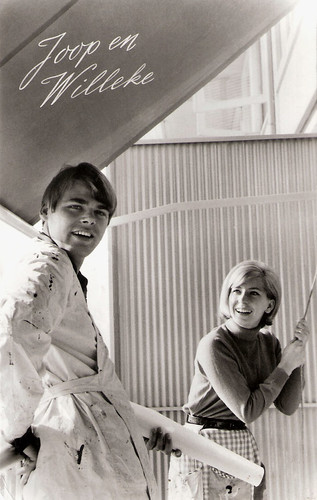
Willeke Alberti and her first husband, Joop Oonk. Dutch postcard by 't Sticht, Utrecht, no. AX 658.
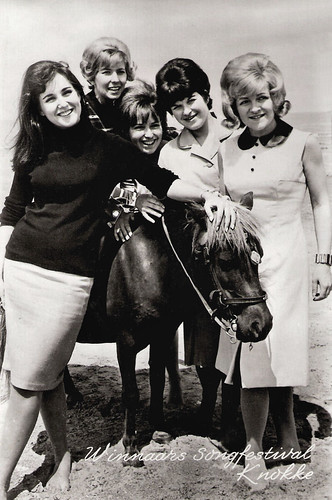
Shirley Zwerus, Willeke Alberti, Trea Dobbs, Rita Hovink, Ilonka Bilushka. Dutch postcard by Uitg. Takken, Utrecht, no. 5920. In 1964 this Dutch delegation won the Songfestival of Knokke in Belgium a.k.a. the European Cup for Vocal Recitation. Ten years later, only Willeke Alberti and Rita Hovink were still beloved performers. Hovink died in 1979.

Willeke Alberti with her colleagues Anneke Grönloh (middle), Johnny Lion and the Young Sisters (left and right). Dutch postcard by N.V. v.h. Weenenk & Snel, Baarn, no. 963. Photo: Phonogram / Philips.
Torch song
Willeke Alberti and her father Willy Alberti had a popular television show between 1965 and 1969. Her singing career from 1970 onwards was less active.
However, Alberti still releases singles and albums at irregular intervals and plays roles in television programs and films. In 1970 she played the leading part in the popular television series De Kleine Waarheid/The Little Truth (Willy van Hemert, 1970) that won the Televizierring, the award for the best Dutch TV program of that year.
This was followed by TV films like Pygmalion (Paul Pouwels, 1974), and series like Medisch Centrum West/Medical Center West (1991).
In 1975 she played the lead in her major film Rooie Sien/Red Sien (Frans Weisz, 1975), in which she sang her torch song 'Telkens Weer'(Times and Times Again).
Other popular films were Oom Ferdinand en de Toverdrank/Uncle Fred and the Magic Potion (Karst van der Meulen, 1974) and Feestje/Party (Paul Ruven, 1995) starring Dutch entertainer Paul de Leeuw.
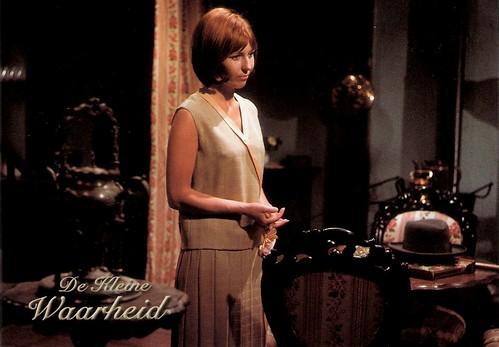
Dutch postcard by NCRV. Photo: NCRV / Instituut voor Beeld en Geluid. Publicity still for the Dutch TV series De kleine waarheid/The small truth (Willy van Hemert, 1970–1972) starring Willeke Alberti.
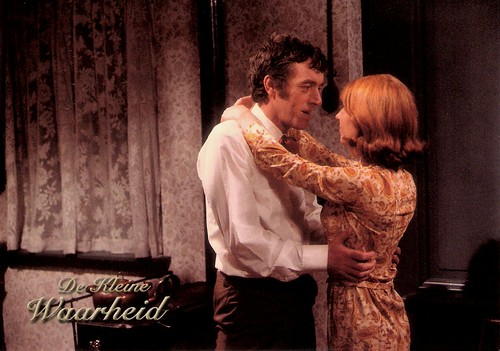
Dutch postcard by NCRV. Photo: NCRV / Instituut voor Beeld en Geluid. Publicity still for the Dutch TV series De kleine waarheid/The small truth (Willy van Hemert, 1970–1972) starring Willeke Alberti and John Leddy.
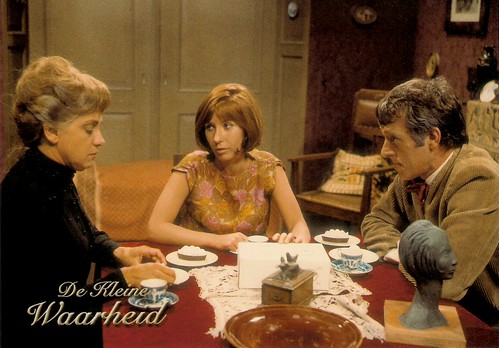
Dutch postcard by NCRV. Photo: NCRV / Instituut voor Beeld en Geluid. Publicity still for the Dutch TV series De kleine waarheid/The small truth (Willy van Hemert, 1970–1972) starring Willeke Alberti, John Leddy and Emmy Lopes Dias.
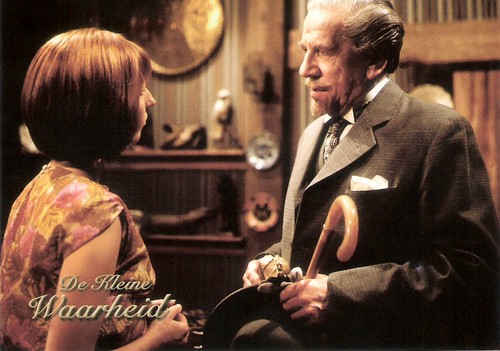
Dutch postcard by NCRV. Photo: NCRV / Instituut voor Beeld en Geluid. Publicity still for the Dutch TV series De kleine waarheid/The small truth (Willy van Hemert, 1970–1972) starring Willeke Alberti.
As long as there is love
In 1994, Willeke Alberti represented the Netherlands at the Eurovision Song Contest. Her song 'Waar is de Zon' (Where is the Sun) only claimed a meagre four points from the international juries. That same year a musical about her life was made, simply called 'Willeke the Musical'. It contained many of her hits. In 1995 she made a concert tour celebrating her 50th birthday.
In 2004 and 2005 Willeke played Dolly in the Dutch version of the musical Hello Dolly. In 2008 she appeared regularly in the popular soap Goede Tijden, Slechte Tijden/Good Times Bad Times, in which her son Johnny earlier started his acting career.
Willeke Alberti was seen in the cinema in the comedy Alles is familie/Family Way (Joram Lürsen, 2012) starring Carice van Houten, and she appeared as the retired Dutch queen in the family film Sinterklaas en de pepernoten chaos/St Nicholas and the pepernoten chaos (Martijn van Nellestijn, 2013) with Wim Rijken as Sinterklaas. Her most recent film is the romantic comedy Hartenstrijd/Heart fight (Janice Pierre, 2016).
Willeke herself certainly has not retired. After her critically acclaimed role in the stage musical De Jantjes (The Tars) (2012-2013), she returned to the theatre for a series of concerts under the title 'Willeke in Concert, as long as there is Love'. With her son Johnny, Willeke Alberti re-recorded her father's old hit 'De glimlach van een kind' (The Smile of a Child). In January 2014 it reached the Dutch charts. All proceeds from the song go to the foundation of Het Vergeten Kind (The Forgotten Child).
Through the years, Alberti has become embraced in the Netherlands as a gay icon, due to a combination of her song repertoire, her durability, and her performances in support of manifold gay and other causes. In 2001 she established the Willeke Alberti Foundation, to structurally improve the well-being and quality of life of seniors, children and the sick in nursing homes and care homes, by organising various cultural activities.
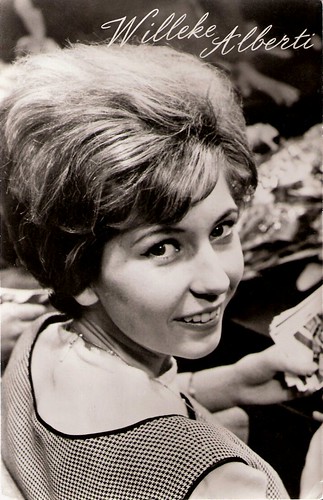
Dutch postcard by Uitg. Takken, Utrecht, no. AX 5442, sent by mail in 1963.

Dutch postcard, no. 11-66Ph 2694. Publicity card for Philips. Autograph of Willeke Alberti.
Dutch postcard, no. 1165. Photo: Phonogram.
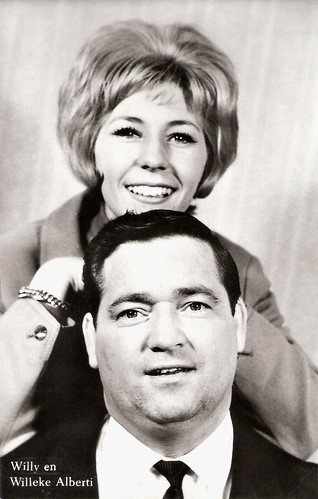
Dutch postcard by Gebr. Spanjersberg N.V. (Sparo), no. 1296. Photo: Phonogram.

Dutch postcard by Uitg. Hercules, Haarlem. Photo: Phonogram.
Willeke Alberti sings 'Spiegelbeeld' (1963). Source: Herman (YouTube).
Willeke Alberti sings 'Telkens' weer from the film Rooie Sien (1975). Source: 1960Robbio (YouTube).
Willeke Alberti sings 'Waar is de Zon' at the Eurovision Song Contest 1994. Source: Ptimadonna11 (YouTube).
Willeke Alberti and Johnny de Mol sing 'De glimlach van een kind' (The smile of a child). Source: Het vergeten kind (YouTube).
Sources: Willeke Alberti.nl (Dutch), Wikipedia, and IMDb.
This post was last updated on 11 April 2023.
No comments:
Post a Comment